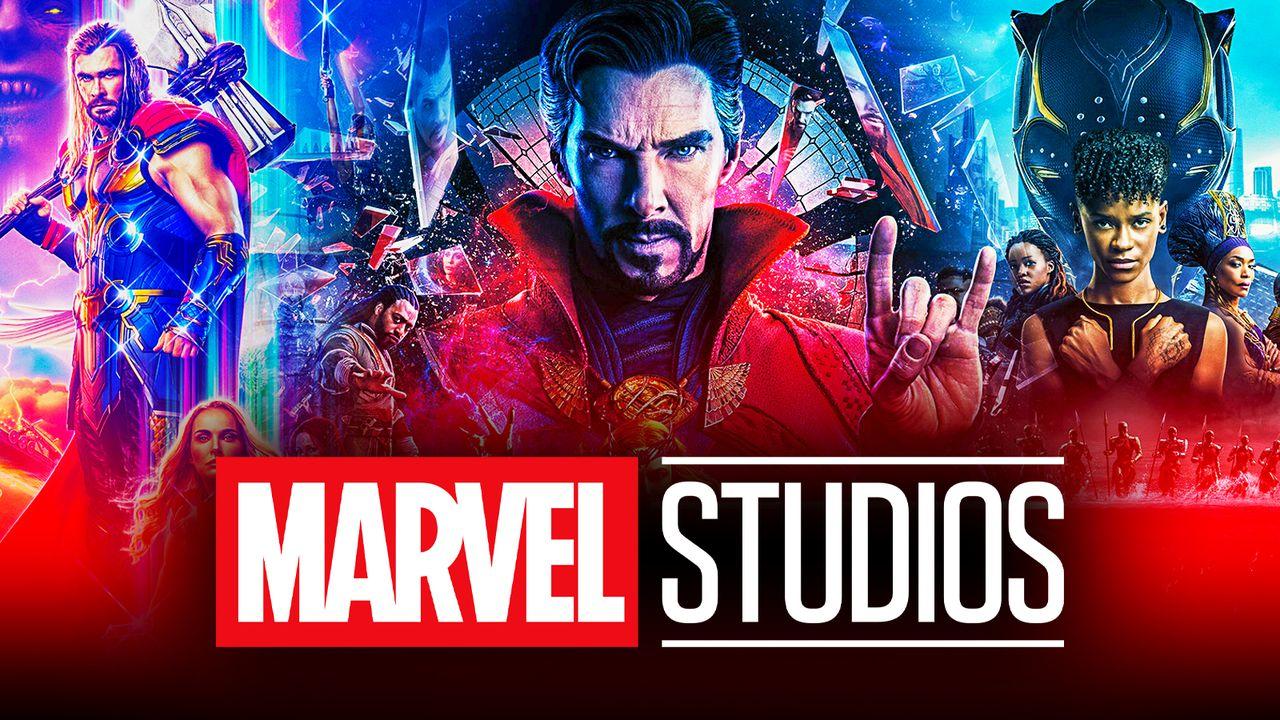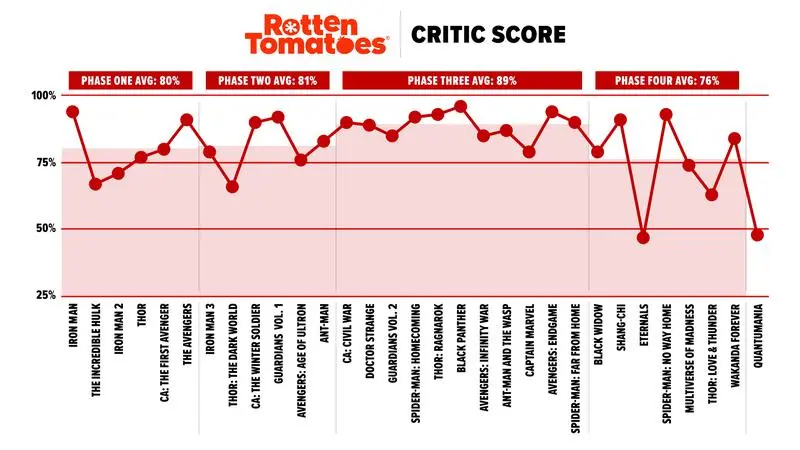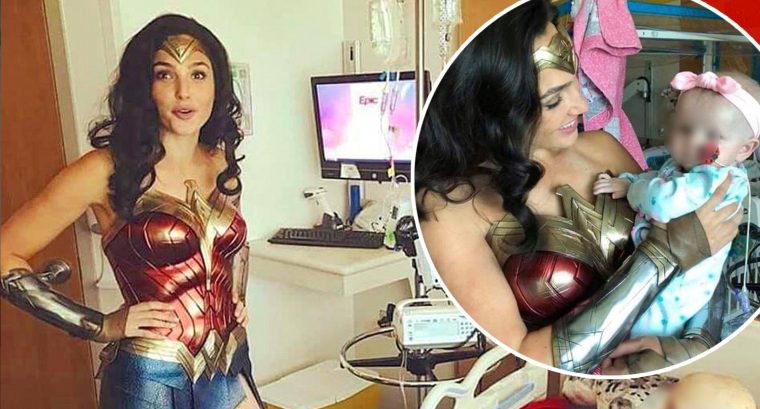
After reaching heights no movie franchise ever dreamed of reaching, the Marvel Cinematic Universe has seemingly been living in its own shadow since Avengers: Endgame.
The Infinity Saga was 23 movies over 11 years that weaved dozens of characters, stories, and moments together into one of the most critically acclaimed sagas in movie history. After a lost year due to the COVID-19 pandemic, fans and critics alike seem to agree that the MCU has yet to get back to the success of its glory days.
But are MCU movies actually getting worse?
Three metrics are key in answering that question. Rotten Tomatoes is a percentage of “positive” reviews. Metacritic is a weighted score by industry professionals. And the CinemaScore is a grade from eager moviegoers.
So, diving into these numbers for the MCU, here is a look at how Phase Four and Five are keeping up with the golden era of comic book content.
Rotten Tomatoes Critic Score

Rotten Tomatoes Critic Score
The Rotten Tomatoes Critic Score is actually not a rating at all. It is an “enjoyment” metric that shows the percentage of “positive” reviews from verified critics. In layman’s terms, it is a measurement of how much critics believe audiences should go see a movie or watch a show.
Key Metric: 75% is the threshold between a movie that is considered “Fresh” and “Certified Fresh”. While anything below 60% is considered “Rotten”.
Critics seemed to have appreciated the MCU early with only three of the 12 movies in Phases One and Two falling below 75%. Then they all became superfans throughout Phase Three, with only one movie out of 12 (Captain Marvel) falling below 80%; and even that entry came in at 79%.
Phase Four follows the most critically acclaimed Phase with the most polarizing. Not only did Phase Four have the highest percentage of movies underneath that Certified 75% threshold, but it also features the MCU’s first “Rotten” movie in Eternals (47%).
It is important to note that when Phase Four hits, it hits hard. While only three movies were given a Certified Fresh rating (Shang-Chi, Spider-Man: No Way Home, and Black Panther 2) those movies averaged 89% with both Shang-Chi and No Way Home joining the coveted +90% club that only 12 MCU movies belong to.
While Phase 5 was positioned to be the saving grace for the new-era Multiverse Saga, it tripped coming out the gate with the second “Rotten” MCU film as Ant-Man and The Wasp Quantumania sits at 47%. Not great news critically for the first proper introduction of the saga’s biggest bad so far.
Metacritic Critic Score

Metacritic Critic Score
The Metacritic Metascore is much closer to an actual rating of the movie. Metacritic compiles reviews from a variety of critics and combines them in a weighted formula that gives “well-established” writers more value. This is considered arbitrary, but it is what it is.
Key Metric: Metacritic is a 0-100 score where anything above 60% receives a green label. Anything above 81% is given a “Must-See” label. Metacritic reports roughly 5% of recorded movies have reached this status. (There are only nine movies with a perfect 100 and only one of them was made this century.)
While Metacritic critics took more time to warm up to the MCU, still only three movies fell below the 60% mark through Phase Two (Iron Man 2, Thor, Thor: The Dark World). Phase Three followed the same pattern as Rotten Tomatoes with no movies falling below 60% and the average skyrocketing from 65% to 73%.
Then Phase Four tanks that progress again, with the average falling back down to 64% and the lowest Metacritic score in the MCU, Eternals again with 52%. Phase Five made sure that did not last long with Quantumania taking another stumble with the new low-record 48%.The “better” movies of the Multiverse Saga so far have performed very well, but do not stand out as much as they did in the Rotten Tomatoes ranking. Phase 4 is the first MCU Phase without a movie that surpasses a 75% Metacritic score.
Critic Score Trends

Average Critic Score (RT & Metacritic)
The certified critics from both Rotten Tomatoes and Metacritic overall agree that the Marvel Cinematic Universe peaked in Phase Three with only one movie dropping below an Average Critic Score (ACS) (combining Rotten Tomatoes and Metacritic Ratings) of 75%. In fact, Phase Three has 58% of Marvel Studios movies scoring above 75%.
From there it is a story of hits and misses for The Multiverse Saga and not a ton in between. The only actual bright spots for critics in Phases Four and Five are Shang-Chi and No Way Home. One is an origin story for arguably the fourth most popular Marvel Comics martial artists (prior to the movie’s release) and the other is the only movie that can rival the magnitude of Avengers: Endgame.
The concerning aspect of these numbers is that the legacy franchises, outside of Spider-Man, are not living up to their predecessors. After two Phases of being last in Average Critic Score, the Thor franchise went on to have Phase Three’s third-best ACS with Thor: Ragnarok. Thor: Love & Thunder follows that up by tying Dark World for the lowest ACS in the franchise (60%).
Doctor Strange debuted the Master of the Mystic Arts with an impactful 81% Average Critic Score, tying with Shang-Chi for the 2nd-highest-rated true MCU origin movie, behind Iron Man. Doctor Strange in The Multiverse Of Madness comes in with an ACS of 67%, the second-largest drop ever for an MCU sequel.
Black Panther: Wakanda Forever is above 75% Average Critic Score and by all accounts a top-half critically acclaimed MCU movie, but it pales in comparison to the original Black Panther at 92%, the highest in the MCU.
CinemaScore

Cinema Score
CinemaScore is a manual poll given to audience members in key regions of the US and Canada directly after screenings on a movie’s opening weekend. These are a measure of how the most passionate fans of these movies felt directly after their first watch. Instead of a 0-100 value, CinemaScores are given letter grades from A+ to F.
Key Metric: for visual purposes and comparisons to Rotten Tomatoes and Metacritic, the letter grades have been converted to percentages within the grading scale.
A+ = 95% | A = 93% | A- = 90% | B+ = 87% | B = 85% | B- = 83%. No Marvel Studios movie has received lower than a B-.
This is a much more telling analytical story of the infamous to some, revered by others, “Marvel Formula”. By the time The Avengers came around in 2012, it was smooth sailing for Marvel Studios and their fanbase. Of the 17 remaining movies in The Infinity Saga, only two received lower than an “A” grade, and those two (Thor: Dark World and Ant-Man and The Wasp) both received an “A-“.
Heading into The Multiverse Saga, they couldn’t miss. Three movies into Phase Four and the now statistically infamous Eternals, Marvel Studios received their first “B-“. That was followed up by two more “B” grades to close Phase Four and another “B-” to open Phase Five in Quantumania.
Final Verdict for CinemaScore Voters: The roughest 8-movie stretch in the history of the MCU.
Rotten Tomatoes Audience Score

Rotten Tomatoes Audience Score
The Rotten Tomatoes Audience Score acts the same as the critic score as a measurement of “positive” reviews from users. It is slightly more condensed with a 0-5 score determining the percentage with 3.5 being the threshold for “positive”.
Key Metric: Until 2019, Audience Scores were the wild, wild west where anyone who had a Rotten Tomatoes account could put in their score. In 2019, RT activated a verification system for users to ensure that people scoring these movies had 1.) Actually seen the film and 2.) Have a valid opinion outside of “review bombing.”
Many believe that the review bombing of Captain Marvel is what pushed this initiative. As can be seen in the graphic above and the discrepancy from the critics’ score (-49%), this is an outlier that suggests foul play.
Every critic metric and the CinemaScore voters all point to Phase Four as being the worst of the completed MCU Phases. Rotten Tomatoes Audience Score couldn’t disagree more. Technically, Phase Four is the highest-rated Phase in the MCU so far. If the outlier “review bomb” tainted Captain Marvel was removed from Phase Three, it would be number one, but the numbers are the numbers.
The MCU has consistently been above 75% since 2013 (outside of Captain Marvel). Phase Four has four of the top 10 scores for Rotten Tomatoes Audiences and a firm grasp on the top two spots with Shang-Chi and No Way Home tied for number one. The real story here is the lack of dips in the chart compared to the others. Black Widow, Multiverse of Madness, and Wakanda Forever all are well above average in this metric where they are dragging the average down in other votes.
It should be noted, though, that the verification system to prevent review bombing could be a helpful factor in keeping the post-Captain Marvel movies on the higher end of the scale.
Metacritic Audience Scores

Metacritic Audience Score
The Metacritic Audience Score is a true user vote from the Metacritic audience. It comes with the same issues the Rotten Tomatoes Audience score had but in the same way, Captain Marvel continues to be the only major outlier.
This pure 0-100 rating of the movie is one of the most transparent statistics on this list, but it does lack the validity of other scores. Many websites like IMDb and Letterboxd have the same access, but Metacritic has the name value.
This is where the notion that Marvel fans automatically love everything Marvel Studios does, no matter what comes from. Every Phase of the MCU has a Rotten Tomatoes Critic Score lower than the Audience Score. Both Phase Three and Four have average critic scores higher than the average audience scores.
And while this does even the narrative, it also reflects that Phase Four once again stands out as the weak link. Five of the six lowest Metacritic Audience scores belong to the post-Infinity Saga era. Phase Four in the Metacritic Audience score is without a doubt the weakest Phase in this entire study.
Audience Score Trends

Average Audience Score (RT & Metacritic)
The Average Audience Score (AAS) combines the Rotten Tomatoes and Metacritic Scores to get an overall feeling for how the audience is reacting to the MCU. This does not include the Cinema Score to get a better idea of long-term reactions to these movies.
Phase Four did not follow up on the hype and success of Phase Three but it is holding water with the rest of the Marvel Cinematic Universe. It is still cause for concern that the largest tentpoles like Doctor Strange and Thor were not able to provide spikes for audiences. Shang-Chi and No Way Home carry the team to an overall good feeling after Phase Four.
The biggest note from the Audience Average is the score for Ant-Man and The Wasp Quantumania. The Phase Five opening movie has been an eye-sore on the majority of charts, but the AAS shows fans had a good time with Quantumania.
Are Marvel Movies Really Getting Worse?

Critic Score vs Audience Score
Comparing the Average Critic Score and the Average Audience Score tells the story of how Marvel Studios movies are trending post-Infinity Saga. Critics and Audiences alike are taking the MCU one movie at a time. A handful of big hits in Phase Four along with a few of Marvel’s biggest misses makes for the MCU’s most polarizing Phase.
The biggest highlight of this chart falls at the very end with Ant-Man and The Wasp Quantumania. The polarizing Phase Five leadoff movie holds the second-largest gap between critics and audiences only behind the suspect scores of Captain Marvel.
This is a sign that fans are willing to be ready for Phase Five to deliver on the foundational vibe of Phase Four. Critics on the other hand seem to be in a position where Marvel Studios has to earn it again. The last time critics were this low on the MCU was Thor: The Dark World. Marvel Studios responded with two of the most beloved movies in The Infinity Saga in Captain America: The Winder Soldier and Guardians of the Galaxy Vol. 1.
Up next for Marvel Studios is a similar back-to-back that might be just what the MCU needs to get back on track. Guardians of the Galaxy Vol. 3 looks to provide the same spark to the MCU the original did and The Marvels looks to follow in Winter Soldier’s footsteps being an epic MCU crossover sequel.
The reality of the situation is that Marvel Studios is at a crossroads. Critics are trending out of favor for Hollywood’s biggest franchise while fans are hanging in there loyal and in desperate need to be blown away.
The rest of the 2023 theatrical slate for Marvel Studios is a make-or-break moment for the red brand. All of the pieces are in place for the first back-to-back critical hits since Phase Three.








